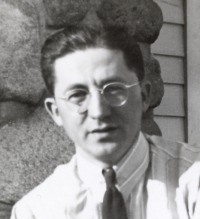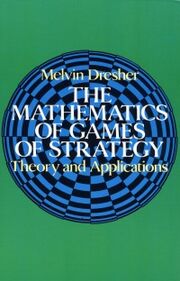Biography:Melvin Dresher
Melvin Dresher | |
|---|---|
 Melvin Dresher, early 1940s | |
| Born | March 13, 1911 Krasnystaw, Poland |
| Died | June 4, 1992 (aged 81) Kern, California, US |
| Education | Lehigh University Yale University |
| Known for | Prisoner's dilemma |
| Scientific career | |
| Fields | Mathematics |
| Institutions | Michigan State College War Production Board National Defense Research Committee Catholic University of America RAND |
| Doctoral advisor | Øystein Ore |
Melvin Dresher (born Dreszer; March 13, 1911 – June 4, 1992) was a Poland -born United States mathematician, notable for developing, with Merrill Flood, the game theoretical model of cooperation and conflict known as the Prisoner's dilemma while at RAND in 1950 (Albert W. Tucker gave the game its prison-sentence interpretation, and thus the name by which it is known today).[1][2]
Education and career

Dresher came to the United States in 1923. He obtained his B.S. from Lehigh University in 1933 and his Ph.D. from Yale University in 1937 under the supervision of Øystein Ore; the title of his dissertation was "Multi-Groups: A Generalisation of the Notion of Group." Dresher worked as instructor of mathematics, Michigan State College, 1938–1941; statistician, War Production Board, 1941–1944; mathematical physicist, National Defense Research Committee, 1944–1946; professor of mathematics, Catholic University of America, 1946–1947; research mathematician, RAND, from 1948.
Dresher was the author of several RAND research papers on game theory, and his widely acclaimed The Mathematics of Games of Strategy: Theory and Applications (originally published in 1961 as Games of Strategy: Theory and Applications) continues to be read today. Dresher's research has been referred to and discussed in a variety of published books, including Prisoner's Dilemma by William Poundstone and A Beautiful Mind by Sylvia Nasar.[3]
Family
Dresher married Martha Whitaker (m. 1937) and is survived by his daughter Olivia Dresher (b. 1945)[4] and son Paul Dresher (b. 1951).
Bibliography
- Bohnenblust, H.; Dresher, Melvin; Girshick, M.; Harris, Theodore; Helmer-Hirschberg, Olaf; McKinsey, J.; Shapley, Lloyd; Snow, R. (1948) (in en). Mathematical Theory of Zero-Sum Two-Person Games with a Finite Number or a Continuum of Strategies. RAND Corporation. doi:10.7249/r115. https://www.rand.org/pubs/reports/R115.html.
- Berge, Claude, ed (1970). Contributions to the theory of games. 3: C. Berge ... Ed. by M. Dresher. Annals of mathematics studies (4. print ed.). Princeton, NJ: Princeton Univ. Pr. ISBN 978-0-691-07936-3.
- Dresher, Melvin (1981). The mathematics of games of strategy: theory and applications (unabridged republ. of the [ed.] ... Englewood Cliffs, N.J., 1961 ed.). New York: Dover. ISBN 978-0-486-64216-1.
- Dresher, M., ed (1985). Advances in game theory. Annals of mathematics studies (Repr. from the hardcover ed.). Princeton, NJ: Princeton Univ. Press. ISBN 978-0-691-07902-8.
- Dresher, Melvin (2007). Games of strategy: theory and applications (New RAND ed.). Santa Monica, Calif: RAND Corp. ISBN 978-0-8330-4225-5.
References
- Obituary, July 2, 1992 issue of the Palisadian-Post newspaper (Pacific Palisades, California).
- "In Remembrance", July 9, 1992 issue of RAND Items (a biweekly publication for employees of RAND).
- ↑ Taylor, Timothy (2020-01-17). "CONVERSABLE ECONOMIST: The Prisoner's Dilemma: Celebrating its 70th Anniversary". https://conversableeconomist.blogspot.com/2020/01/the-prisoners-dilemma-celebrating-its.html.
- ↑ Kuhn, Steven (2019), Zalta, Edward N., ed., "Prisoner’s Dilemma", The Stanford Encyclopedia of Philosophy (Metaphysics Research Lab, Stanford University), https://plato.stanford.edu/archives/win2019/entries/prisoner-dilemma/, retrieved 2023-12-23
- ↑ Hounshell, David (1997). "The Cold War, RAND, and the Generation of Knowledge, 1946-1962". Historical Studies in the Physical and Biological Sciences 27 (2): 237–267. doi:10.2307/27757779. ISSN 0890-9997. https://www.jstor.org/stable/27757779.
- ↑ Dresher, Olivia (2020-01-17). "OliviaDresher.com: BIO". http://fraglit.com/od/bio/.
 |
